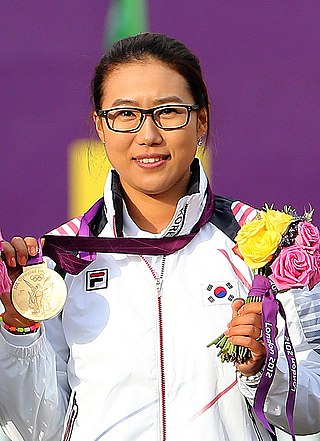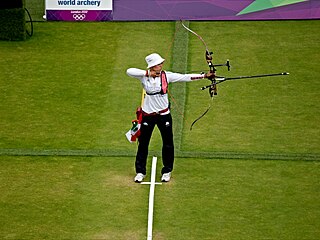
Lee Sung-jin is a recurve archer from South Korea. She is a two-time Olympic gold medalist, winning in the women's team event at the 2004 and 2012 Summer Olympics. In 2005, she became the women's individual recurve champion at the World Championships and achieved the world number one spot for female recurve archers in the World Archery Rankings. In 2016, the World Archery Federation named her as the ninth best Olympic archer in the history of the Games.
Park Sung-hyun is an archer from South Korea who competed in two Olympic Games, winning three gold medals. Park made her international archery debut in 2001, winning the women's recurve title at that year's World Archery Championships. Her Olympic debut came at the 2004 Summer Olympics, where she won gold medals in both the women's individual and women's team events. She won two further medals at the 2008 Summer Olympics, achieving her third Olympic gold in the women's team event before earning the silver medal as the runner-up in the women's individual event.

Archery had its debut at the 1900 Summer Olympics and has been contested in 18 Olympiads. 105 nations have competed in the Olympic archery events, with France appearing the most often at 15 times. The most noticeable trend has been the excellence of South Korean archers, who have won 32 out of 44 gold medals in archery events since 1984. Olympic archery is governed by the World Archery Federation. Recurve archery is the only discipline of archery featured at the Olympic Games. Archery is also an event at the Summer Paralympics.

Aída Nabila Román Arroyo is a Mexican archer. A three-time Olympian, she won silver medal in the women's individual event at the 2012 Summer Olympics and was the women's World Indoor Archery Champion in 2014. She has additionally achieved medal finishes at the World Archery Championships, Archery World Cup, and Pan American Games.

The girls' individual archery event at the 2010 Summer Youth Olympics was held from 18 to 20 August 2010 at the Kallang Field in Kallang, Singapore. It was one of three recurve archery events which comprised the archery programme at the inaugural Summer Youth Olympics, and featured thirty-one archers from thirty-one countries. Entry was open to female archers born between 1 January 1992 and 31 December 1993.

The women's recurve individual archery event at the 2010 Commonwealth Games was a competition held as part of the archery programme at the Yamuna Sports Complex in Delhi, India, from 4 October to 10 October 2010. It was the second time that the recurve individual event for women had been included in the Commonwealth Games and the first time it had been contested since the 1982 Games in Brisbane, Australia.

The women's individual archery event at the 2012 Olympic Games was held from 27 July to 2 August 2012 at Lord's Cricket Ground in London in the United Kingdom. The event was one of four which comprised the 2012 Olympic archery programme of sports and was the eleventh time the women's individual competition was contested as an Olympic event. Forty nations qualified for the competition, sending a total of sixty-four archers to compete. The defending Olympic champion from 2008 was Zhang Juanjuan of China, who did not compete following her retirement in 2010.

Ki Bo-bae is a South Korean recurve archer and three-time Olympic gold medalist. She was the winner of the women's team and women's individual events at the 2012 Summer Olympics and of the women's team event again at the 2016 Summer Olympics, where she also took bronze in the individual competition. Her tally of four Olympic medals places her among the most decorated archers in Olympic history.
Jung Dasomi is an archer from South Korea who specialises in recurve archery. Jung made a highly successful debut in international archery in 2011, winning medals at the World Archery Championships, Archery World Cup and Summer Universiade, and concluding the year as the number one-ranked female recurve archer in the World Archery Rankings. She won two further medals in 2014 at the Asian Games before a downturn in form relegated her from the national team. Jung did not return to international archery competitions until 2018.

The girls' individual archery event at the 2014 Summer Youth Olympics was held from 22 to 25 August 2014 at the Fangshan Sports Training Base in Nanjing, China. One of three recurve archery events which comprised the archery programme, it was the second time the girls' individual discipline was contested at Summer Youth Olympics. Thirty-two archers from thirty-two countries entered the competition, which was open to female archers born between 1 January 1997 and 31 December 1999. The defending champion was South Korea's Kwak Ye-ji, who was unable to defend her title due to the age limitations imposed on the event.

Chang Hye-jin is a South Korean former recurve archer. A two-time Olympic gold medalist, Chang was the Olympic champion in both the women's individual and women's team events at 2016 Summer Olympics in Rio de Janeiro. She is also a former number one-ranked recurve archer, having headed the World Archery Rankings between 2017 and 2019.

The women's individual archery event at the 2016 Summer Olympics was held from 5 to 13 August at the Sambadrome Marquês de Sapucaí in Rio de Janeiro, Brazil. One of four archery events as part of the 2016 Olympic catalogue of sports, it was the fourteenth time a women's individual competition was contested as a discipline at the Olympic Games. Forty different nations qualified for the event, sending a total of sixty-four archers to compete. The defending Olympic champion was Ki Bo-bae of South Korea.
The women's individual recurve archery event at the 2015 Summer Universiade was held at the International Archery Center in Gwangju, South Korea from 4 July to 8 July 2015. It was the fifth time the event had been contested at the Summer Universiade and was its first appearance since the 2011 Summer Universiade, archery having not been selected as part of the sporting programme for the 2013 edition. Open to athletes aged between 17 and 28 enrolled in an undergraduate or postgraduate university programme, a total of fifty-eight archers from twenty-nine countries entered the competition.

Choi Mi-sun is a South Korean recurve archer. She won gold medal in the women's team event at the 2016 Summer Olympics in Rio de Janeiro.
The women's individual recurve archery competition at the 2018 Asian Games was held from 21 to 28 August at the Gelora Bung Karno Sports Complex Archery Field in Jakarta, Indonesia. It was the eleventh time the event was held as part of the Asian Games sports programme since the sport's debut in the competition in 1978. A total of 68 archers from 25 nations participated. Jung Dasomi of South Korea entered as the defending champion, having won the women's individual gold medal at the 2014 Asian Games.

The men's team archery event was one of five archery events held at the 2020 Summer Olympics. It was held at Yumenoshima Park, in Tokyo, Japan, with the ranking round taking place on 23 July and match play on 26 July.

The women's team archery event was one of five archery events held at the 2020 Summer Olympics. It was held at Yumenoshima Park, with the ranking round taking place on 23 July and match play on 25 July.

The girls' individual archery event at the 2018 Summer Youth Olympics was held from 12 to 16 October 2018 at the Parque Sarmiento in Buenos Aires, Argentina. One of three recurve archery events which comprised the archery programme, it was the third time the girls' individual discipline had been contested at Summer Youth Olympics. Thirty-two archers from thirty-two countries entered the competition, which was open to female archers born between 1 January 2001 and 31 December 2003. The defending champion was China's Li Jiaman, who was unable to defend her title due to the age limitations imposed on the event.
The women's individual recurve competition at the 2019 European Games was held from 21 to 26 June 2019 at the Olympic Sports Complex in Minsk, Belarus. It was the second time the event was held as part of the European Games archery programme. A total of 48 archers from 32 different nations entered the competition, with a maximum of three entries per country. The event offered one qualifying spot for the women's individual event at the 2020 Summer Olympics for any archer reaching the semi-finals from a nation that had not already qualified. The defending champion, Karina Winter of Germany, did not take part following her retirement from the sport.
The women's individual recurve archery event at the 2019 Pan American Games was held from 7 August to 11 August at the Villa María del Triunfo sports complex in Lima, Peru. One of eight archery events as part of the 2019 Pan American catalogue of sports, it was the eleventh time the women's individual recurve competition had been contested at the Games. Thirty-two archers from fourteen nations qualified for the event.










